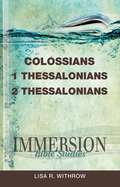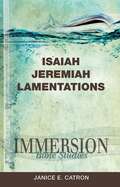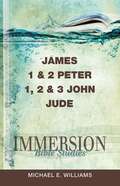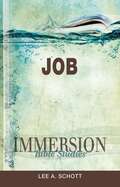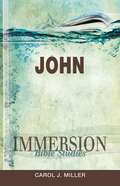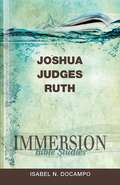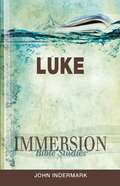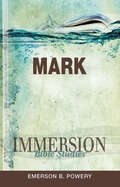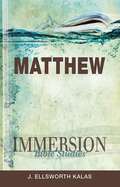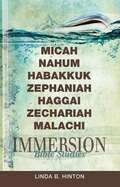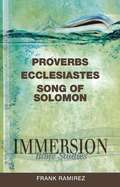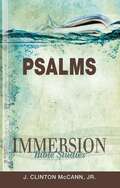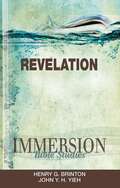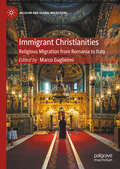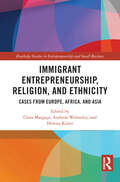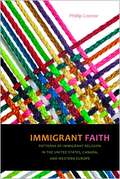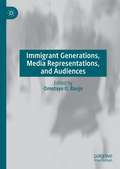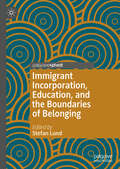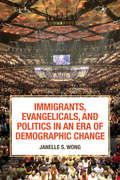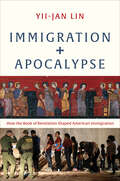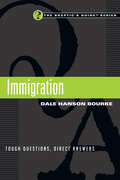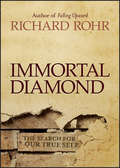- Table View
- List View
Immersion Bible Studies: Immersion Bible Studies (Immersion Bible Studies)
by Lisa R. Withrow Stan PurdumJourney inside the pages of Scripture to meet a personal God who enters individual lives and begins a creative work from the inside out. Shaped with the individual in mind, Immersion encourages simultaneous engagement both with the Word of God and with the God of the Word to become a new creation in Christ. Immersion, inspired by a fresh translation--the Common English Bible--stands firmly on Scripture and helps readers explore the emotional, spiritual, and intellectual needs of their personal faith. More importantly, they’ll be able to discover God’s revelation through readings and reflections.
Immersion Bible Studies: Isaiah, Jeremiah, Lamentations
by Janice E. CatronJourney inside the pages of Scripture to meet a personal God who enters individual lives and begins a creative work from the inside out. Shaped with the individual in mind, Immersion encourages simultaneous engagement both with the Word of God and with the God of the Word to become a new creation in Christ. Immersion, inspired by a fresh translation—the Common English Bible—stands firmly on Scripture and helps readers explore the emotional, spiritual, and intellectual needs of their personal faith. More importantly, they’ll be able to discover God’s revelation through readings and reflections.
Immersion Bible Studies: James - 1 And 2 Peter - 1,2 And 3 John Jude (Immersion Bible Studies)
by Michael E. WilliamsIn this eight-week study, Michael E. Williams explores James, 1 & 2 Peter, 1, 2, & 3 John, and Jude not only with a keen theological eye and a pastor's heart, but also with the imagination of a poet and master storyteller. The Bible stories come alive and are connected to everyday life in a ways that help us see the workings of God in our lives. Easy-to-follow, step-by-step suggestions for leading a group are provided, as well as questions to facilitate class discussion. Immersion, inspired by a fresh translation--the Common English Bible--stands firmly on Scripture and helps readers explore the emotional, spiritual, and intellectual needs of their personal faith. More importantly, they’ll be able to discover God’s revelation through readings and reflections.
Immersion Bible Studies: Job
by Lee A. SchottThere is more to the story of Job than the first and last chapters, for it is the chapters in between that mirror man's own life struggles. Immersion: Job enables readers to enter the story and experience the trials of life through the eyes of Job. Easy-to-follow, step-by-step suggestions for leading a group are provided, as well as questions to facilitate class discussion. Immersion, inspired by a fresh translation--the Common English Bible--stands firmly on Scripture and helps readers explore the emotional, spiritual, and intellectual needs of their personal faith. More importantly, they’ll be able to discover God’s revelation through readings and reflections.
Immersion Bible Studies: John
by Carol J. MillerJourney inside the pages of Scripture to meet a personal God who enters individual lives and begins a creative work from the inside out. Shaped with the individual in mind, Immersion encourages simultaneous engagement both with the Word of God and with the God of the Word to become a new creation in Christ. Immersion, inspired by a fresh translation—the Common English Bible—stands firmly on Scripture and helps readers explore the emotional, spiritual, and intellectual needs of their personal faith. More importantly, they’ll be able to discover God’s revelation through readings and reflections.
Immersion Bible Studies: Joshua, Judges, Ruth
by Isabel N. DocampoIsabel Docampo provides fresh insight into the books of Joshua, Judges, and Ruth by enabling readers to see these ancient texts through new eyes and discover new applications for their lives. Docampo’s passion for her subject is never far beneath the surface of these pages and often bursts forth with telling insights. After using this study guide, readers will never again view these three books of the Bible as mere biblical history. Immersion, inspired by a fresh translation—the Common English Bible—stands firmly on Scripture and helps readers explore the emotional, spiritual, and intellectual needs of their personal faith. More importantly, they’ll be able to discover God’s revelation through readings and reflections.
Immersion Bible Studies: Luke
by Dr Emerson B. PoweryJourney inside the pages of Scripture to meet a personal God who enters individual lives and begins a creative work from the inside out. Shaped with the individual in mind, Immersion encourages simultaneous engagement both with the Word of God and with the God of the Word to become a new creation in Christ. Immersion, inspired by a fresh translation--the Common English Bible--stands firmly on Scripture and helps readers explore the emotional, spiritual, and intellectual needs of their personal faith. More importantly, they’ll be able to discover God’s revelation through readings and reflections.
Immersion Bible Studies: Mark
by Dr Emerson B. PoweryJourney inside the pages of Scripture to meet a personal God who enters individual lives and begins a creative work from the inside out. Shaped with the individual in mind, Immersion encourages simultaneous engagement both with the Word of God and with the God of the Word to become a new creation in Christ. Immersion, inspired by a fresh translation--the Common English Bible--stands firmly on Scripture and helps readers explore the emotional, spiritual, and intellectual needs of their personal faith. More importantly, they’ll be able to discover God’s revelation through readings and reflections.
Immersion Bible Studies: Matthew (Immersion Bible Studies)
by Dr J. Ellsworth KalasJourney inside the pages of Scripture to meet a personal God who enters individual lives and begins a creative work from the inside out. Shaped with the individual in mind, Immersion encourages simultaneous engagement both with the Word of God and with the God of the Word to become a new creation in Christ. Immersion, inspired by a fresh translation--the Common English Bible--stands firmly on Scripture and helps readers explore the emotional, spiritual, and intellectual needs of their personal faith. More importantly, they’ll be able to discover God’s revelation through readings and reflections.
Immersion Bible Studies: Micah, Nahum, Habakkuk, Zephaniah, Haggai, Zechariah, Malachi
by Linda B. HintonJourney inside the pages of Scripture to meet a personal God who enters individual lives and begins a creative work from the inside out. Shaped with the individual in mind, Immersion encourages simultaneous engagement both with the Word of God and with the God of the Word to become a new creation in Christ. Immersion, inspired by a fresh translation--the Common English Bible--stands firmly on Scripture and helps readers explore the emotional, spiritual, and intellectual needs of their personal faith. More importantly, they’ll be able to discover God’s revelation through readings and reflections.
Immersion Bible Studies: Proverbs, Ecclesiastes, Song Of Solomon (Immersion Bible Studies)
by Rev Frank RamirezHow does someone obtain wisdom, knowledge, and understanding? How do they apply them to their lives? This volume of Immersion Bible Studies focuses on touchstone Scriptures that reveal the essence of wisdom as found in Proverbs, Ecclesiastes, and Song of Solomon. Written in a conversational tone, this study engages readers in the virtues shared while deepening their love of the Bible. Easy-to-follow, step-by-step suggestions for leading a group are provided, as well as questions to facilitate class discussion. Immersion, inspired by a fresh translation--the Common English Bible--stands firmly on Scripture and helps readers explore the emotional, spiritual, and intellectual needs of their personal faith. More importantly, they’ll be able to discover God’s revelation through readings and reflections.
Immersion Bible Studies: Psalms
by Prof. J. Clinton McCann JR.Imagine a life of true happiness, a life of complete honesty with God. Through this study of the Scriptures, you learn how to live a life of gratitude while producing actions that honor God. Easy-to-follow, step-by-step suggestions for leading a group are provided as well as questions to facilitate class discussion. This eight-week volume is part of the Immersion Bible Studies series. Inspired by a fresh translation, the Common English Bible (CEB), Immersion stands firmly on Scripture and helps you explore the emotional, spiritual, and intellectual needs of your personal faith. Whether you are using the CEB or another translation, Immersion will offer new insights into God’s Word, your own life, and your life with God. Psalms features eight sessions.
Immersion Bible Studies: Revelation
by Henry G. Brinton Rev John Y. H. YiehThe end times. How should I approach such a topic? With hopefulness? intimidation? Do I even understand it? What does it mean to me? Immersion Bible Studies – Revelation helps answer the questions that often leave most readers puzzled. Over the course of this eight-week study, it will deepen the reader’s knowledge of this challenging but important book of the Bible and find hope through the revelation of Jesus Christ. Easy to follow, step-by-step suggestions for leading a group are provided as well as questions to facilitate class discussion. Immersion, inspired by a fresh translation--the Common English Bible--stands firmly on Scripture and helps readers explore the emotional, spiritual, and intellectual needs of their personal faith. More importantly, they’ll be able to discover God’s revelation through readings and reflections.
Immigrant Christianities: Religious Migration from Romania to Italy (Religion and Global Migrations)
by Marco GuglielmiOver the past two decades, Romanian immigration to the Italian Peninsula has grown to nearly a quarter of the country&’s foreign population, making it the largest Romanian diaspora in the world. This volume is the first to examine the religious dimension of this vast migratory phenomenon from multiple perspectives, including sociology, anthropology, ethnology, history, and theology.The chapters study the patterns and transformations of Romanian Churches and Christian movements in Italy, with particular attention to the Romanian Orthodox Church, the Romanian Roman Catholic Church, the Romanian Greek-Catholic Church, and the Romanian Pentecostal Church. They also analyze how these immigrant Churches and religious movements engage with Italian society and respond to contemporary challenges.Drawing on the study of the Romanian diaspora and grounded in a multidisciplinary perspective, this volume develops the notion of immigrant Christianities. The latter provides a heuristic framework for highlighting the growing entanglements and transformative dynamics shaping the multiplicity of immigrant Churches and Christian movements in the contemporary world.
Immigrant Entrepreneurship, Religion, and Ethnicity: Cases from Europe, Africa, and Asia (Routledge Studies in Entrepreneurship and Small Business)
by Clara Margaça, Andreas Walmsley, and Helena KnörrInternational migration is a growing phenomenon in the 21st century and is increasingly seen as a high-priority public policy issue by many governments, politicians, and the broader public throughout the world. Its importance to economic prosperity, human development, and safety and security ensures that it will remain a top priority for the foreseeable future.This book highlights the importance of ensuring that we remain focused on the successes of migration as well as the challenges. At the end of the 20th century, more importance was given to immigrant and ethnic minority entrepreneurship due to its positive impact on local economic growth and overall economic development in the hosting nations. In the 21st century, the imperative of the United Nations 2030 agenda involves a deeper understanding of the complex challenges for the achievement of sustainable goals. One of these challenges is to understand how migrant-entrepreneurs may or may not identify with their ethnic community, therefore dissociating themselves from their ethnic group. In this sense, religion and ethnicity are differentiating factors between social groups, and the relationships allow preserving their culture and establishing relationships and integration in the community at all levels. This edited volume brings together impactful contributions that will interest multidisciplinary academic areas and aims to contribute to the enhancement of scientific knowledge on the intersection of entrepreneurship, migration, ethnicity, and religion, a gap in the existing literature that has the potential to provide a deeper understanding of factors that influence migrant populations’ contribution to socio-economic development in their communities.This book will be an invaluable resource to researchers and scholars in the fields of immigration, immigrant entrepreneurship, entrepreneurial culture, and economic development.
Immigrant Faith: Patterns of Immigrant Religion in the United States, Canada, and Western Europe
by Phillip ConnorImmigrant Faith examines trends and patterns relating to religion in the lives of immigrants. The volume moves beyond specific studies of particular faiths in particular immigrant destinations to present the religious lives of immigrants in the United States, Canada, and Europe on a broad scale. Religion is not merely one aspect among many in immigrant lives. Immigrant faith affects daily interactions, shapes the future of immigrants in their destination society, and influences society beyond the immigrants themselves. In other words, to understand immigrants, one must understand their faith. Drawing on census data and other surveys, including data sources from several countries and statistical data from thousands of immigrant interviews, the volume provides a concise overview of immigrant religion. It sheds light on whether religion shapes the choice of destination for migrants, if immigrants are more or less religious after migrating, if religious immigrants have an easier adjustment, or if religious migrants tend to fare better or worse economically thannon-religious migrants.Immigrant Faith covers demographic trends from initial migration to settlement to the transmission of faith to the second generation. It offers the perfect introduction to big picture patterns of immigrant religion for scholars and students, as well as religious leaders and policy makers.
Immigrant Generations, Media Representations, and Audiences
by Omotayo O. BanjoThis anthology examines how immigrants and their US-born children use media to negotiate their American identity and how audiences engage with mediated narratives about the immigrant experience (cultural adjustments, language use, and the like). Where this work diverges from other collections and monographs is the area is its intentional focus on how both first- and second-generation Americans’ complex identities and hybrid cultures interact with mediated narratives in general, alongside the extent to which these narratives reflect their experience. In a three-part structure, the collection examines representations, “zooms in” to explore the reception of these narratives through autoethnographic essays, and concludes in a section of analysis and critique of specific media.
Immigrant Incorporation, Education, and the Boundaries of Belonging
by Stefan LundIn this edited volume, authors analyze how symbolic boundaries of belonging are negotiated and reflected upon by school actors in different educational contexts and how that contributes to a richer understanding of the ways in which "we-ness" acts as a fundamentally structuring force in immigrant incorporation. The analyses draw on cultural sociologist Jeffrey Alexander's work on civil sphere theory, thus grasping both the solidaristic dimensions of incorporation and processes of exclusion. Chapters are guided by two major themes: school choice/ethnic school segregation and religion/faith in schooling. Both of these themes provide rich examples of how immigrant school actors negotiate the symbolic codes that define boundaries of belonging/non-belonging in different communities. This focus will broaden the understanding of how educational practices and formal schooling works in relation to immigrant incorporation into different school cultures, as well as in the Swedish civil sphere.
Immigrant Saint: The Life of Mother Cabrini
by Pietro Di DonatoFrancesca Maria Cabrini was born in 1850 in a small village on the Lombard Plain of Italy. At the moment of her birth, a cloud of snow-white doves appeared and circled the village, an augury of her future sanctity. Tiny frail and sickly, she was enthralled as a child by tales of the adventures of missionaries to faraway lands, and grew up with one burning desire: to join a religious order and tend to the physical and spiritual needs of the people of China. But no order would have her—her health was deemed too precarious. But her dream remained, and she set out to see it realized. Her first step, a formidable one, was obtaining an audience with His Holiness, Pope Leo XIII. This she did, after overcoming many obstacles. It was a meeting that would change her life, and the lives of so many in America. Mother Cabrini was granted her wish to start an orphanage abroad-but not in China, as she had requested. “Not East, but West, my child,” said Pope Leo, and her path was set.PIETRO DI DONATO’S Immigrant Saint: The Life of Mother Cabrini is a powerful nonfiction account of a woman whose gripping story of perseverance, courage, and profound godliness serves as a paradigm for the new age of faith. Written in the fluid prose that made it a huge popular success upon its initial publication in 1960, Immigrant Saint is a book that makes us re-examine, and ultimately reaffirm, our belief in the possibilities of prayer, the validity of miracles, and the crucial importance of good works.“…eloquent, fascinating, miraculous”—Saturday Review
Immigrants, Evangelicals, and Politics in an Era of Demographic Change
by Janelle S. WongAs immigration from Asia and Latin America reshapes the demographic composition of the U.S., some analysts have anticipated the decline of conservative white evangelicals’ influence in politics. Yet, Donald Trump captured a larger share of the white evangelical vote in the 2016 election than any candidate in the previous four presidential elections. Why has the political clout of white evangelicals persisted at a time of increased racial and ethnic diversity? In Immigrants, Evangelicals, and Politics in an Era of Demographic Change, political scientist Janelle Wong examines a new generation of Asian American and Latino evangelicals and offers an account of why demographic change has not contributed to a political realignment. Asian Americans and Latinos currently constitute 13 percent of evangelicals, and their churches are among the largest, fastest growing organizations in their communities. While evangelical identity is associated with conservative politics, Wong draws from national surveys and interviews to show that non-white evangelicals express political attitudes that are significantly less conservative than those of their white counterparts. Black, Asian American, and Latino evangelicals are much more likely to support policies such as expanded immigration rights, increased taxation of the wealthy, and government interventions to slow climate change. As Wong argues, non-white evangelicals’ experiences as members of racial or ethnic minority groups often lead them to adopt more progressive political views compared to their white counterparts. However, despite their growth in numbers, non-white evangelicals—particularly Asian Americans and Latinos—are concentrated outside of swing states, have lower levels of political participation than white evangelicals, and are less likely to be targeted by political campaigns. As a result, white evangelicals dominate the evangelical policy agenda and are overrepresented at the polls. Also, many white evangelicals have adopted even more conservative political views in response to rapid demographic change, perceiving, for example, that discrimination against Christians now rivals discrimination against racial and ethnic minorities. Wong demonstrates that immigrant evangelicals are neither “natural” Republicans nor “natural” Democrats. By examining the changing demographics of the evangelical movement, Immigrants, Evangelicals, and Politics in an Era of Demographic Change sheds light on an understudied constituency that has yet to find its political home.
Immigration and Apocalypse: How the Book of Revelation Shaped American Immigration
by Yii-Jan LinTracing the metaphor of America as the Book of Revelation&’s New Jerusalem, Yii-Jan Lin shows how apocalyptic narratives have been used to exclude unwanted immigrants America appeared on the European horizon at a moment of apocalyptic expectation and ambition. Explorers and colonizers imagined the land to be paradise, the New Jerusalem of the Bible&’s Book of Revelation. This groundbreaking volume explores the conceptualization of America as the New Jerusalem from the time of Columbus to the Puritan colonists, through U.S. expansion, and from the eras of Reagan to Trump. While the metaphor of the New Jerusalem has been useful in portraying a shining, God-blessed refuge with open gates, it has also been used to exclude, attack, and criminalize unwanted peoples. Yii-Jan Lin shows how newspapers, political speeches, sermons, cartoons, and novels throughout American history have used the language of Revelation to define immigrants as God&’s enemies who must be shut out of the gates. This book exposes Revelation&’s apocalyptic logic at work in the history of Chinese exclusion, the association of the unwanted with disease, the contradictions of citizenship laws, and the justification for building a U.S.-Mexico wall like the wall around the New Jerusalem. This book is a fascinating analysis of the religious, biblical, and apocalyptic in American immigration history and a damning narrative that weaves together American religious history, immigration and ethnic studies, and the use of biblical texts and imagery.
Immigration, Popular Culture, and the Re-routing of European Muslim Identity
by Lara N. Dotson-RentaThrough readings of postcolonial theory and examination of post-9/11 novels, film, and hip-hop music, this book studies how North African immigrants to Spain translate and transfer cultural and political memory from one land to another.
Immigration: Tough Questions, Direct Answers (The Skeptic's Guide Series)
by Dale Hanson BourkeHow can we be sure terrorists aren't entering our country? What does it mean to be a citizen? Do immigrants help or hurt the economy? What's wrong with calling someone an illegal immigrant? In this Skeptic's Guide™ Dale Hanson Bourke sheds light on key terms and concepts, historical events and current concerns that drive the immigration debate. Such a complex issue offers no easy answers, but with charts and photos, facts and quotes, this dynamic guide sheds light without adding heat to the most important questions—a hallmark of the Skeptic's Guide series, making it a valuable resource for individuals and groups.
Immortal Diamond
by Richard RohrDissolve the distractions of ego to find our authentic selves in GodIn his bestselling book Falling Upward, Richard Rohr talked about ego (or the False Self) and how it gets in the way of spiritual maturity. But if there's a False Self, is there also a True Self? What is it? How is it found? Why does it matter? And what does it have to do with the spiritual journey? This book likens True Self to a diamond, buried deep within us, formed under the intense pressure of our lives, that must be searched for, uncovered, separated from all the debris of ego that surrounds it. In a sense True Self must, like Jesus, be resurrected, and that process is not resuscitation but transformation.Shows how to navigate spiritually difficult terrain with clear vision and tools to uncover our True SelvesWritten by Father Richard Rohr, the bestselling author of Falling UpwardExamines the fundamental issues of who we are and helps us on our path of spiritual maturityImmortal Diamond (whose title is taken from a line in a Gerard Manley Hopkins poem) explores the deepest questions of identity, spirituality, and meaning in Richard Rohr's inimitable style.
